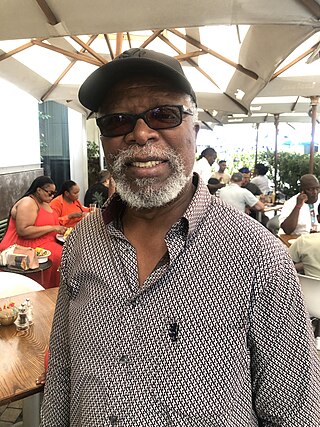Related Research Articles

The University of the Witwatersrand, Johannesburg, commonly known as Wits University or Wits, is a multi-campus public research university situated in the northern areas of central Johannesburg, South Africa. The university has its roots in the mining industry, as do Johannesburg and the Witwatersrand in general. Founded in 1896 as the South African School of Mines in Kimberley, it is the third oldest South African university in continuous operation.

Matamela Cyril Ramaphosa is a South African businessman and politician serving as the 5th and current president of South Africa since 2018. A former anti-apartheid activist and trade union leader, Ramaphosa is also the president (leader) of the African National Congress (ANC).

Bonisile John Kani,, is a South African actor, author, director and playwright. He is known for portraying T'Chaka in the Marvel Cinematic Universe films Captain America: Civil War (2016) and Black Panther (2018), Rafiki in The Lion King (2019) and Colonel Ulenga in the Netflix films Murder Mystery (2019) and Murder Mystery 2 (2023).

The South African Police Service (SAPS) is the national police force of the Republic of South Africa. Its 1,154 police stations in South Africa are divided according to the provincial borders, and a Provincial Commissioner is appointed in each province. The nine Provincial Commissioners report directly to the National Commissioner. The head office is in the Wachthuis Building in Pretoria.

Abahlali baseMjondolo is a socialist shack dwellers' movement in South Africa which primarily campaigns for land, housing and dignity, to democratise society from below and against xenophobia.

The Western Cape Anti-Eviction Campaign was a non-racial popular movement made up of poor and oppressed communities in Cape Town, South Africa. It was formed in November 2000 with the aim of fighting evictions, water cut-offs and poor health services, obtaining free electricity, securing decent housing, and opposing police brutality.
The squatter's movement Abahlali baseMjondolo occupied a piece of vacant state owned land in Macassar Village, near Somerset West outside of Cape Town on 18 May 2009. The occupation was later destroyed by the city's anti-land invasion unit.
South Africa has been dubbed "the protest capital of the world", with one of the highest rates of public protests in the world.

Symphony Way Temporary Relocation Area in Delft, Cape Town, better known by its nickname Blikkiesdorp, is a relocation camp made-up of corrugated iron shacks. Blikkiesdorp, which is Afrikaans for "Tin Can Village", was given its name by residents because of the row-upon-row of tin-like one room structures throughout the settlement.
The Constitution of South Africa protects all basic political freedoms. However, there have been many incidents of political repression, dating back to at least 2002, as well as threats of future repression in violation of this constitution leading some analysts, civil society organisations and popular movements to conclude that there is a new climate of political repression or a decline in political tolerance.
The following lists events that happened during 2012 in South Africa.
In 2009, the Anti-Land Invasion Unit was created by the City of Cape Town in an effort to stop people from illegally attempting to occupy land. In 2011 the City stated that the unit demolished about 300 shacks each month. The Anti-Land Invasions Unit is the biggest unit in the City's law enforcement operation.
Marikana Land Occupation may refer to:
In March 2013 around a thousand people occupied a piece of land in Cato Crest, Durban and named it Marikana after the Marikana miners' strike. Mayor James Nxumalo blamed the occupation on migrants from the Eastern Cape. He was strongly criticised for this by the shack dwellers' movement Abahlali baseMjondolo who said that "The City Hall is red with blood".
On 27 April 2013, the national public holiday of Freedom Day in South Africa which some grassroots social movements have termed UnFreedom Day, members of Abahlali baseMjondolo occupied a piece of land in Philippi, Cape Town. They named the occupation Marikana after the Marikana miners' strike. The occupation was repeatedly destroyed by the city's anti-land invasion unit. According to the Daily Maverick the occupiers were evicted on six separate occasions. Two months after the eviction 90 people were still sleeping on the site under a tent.
Marikana is a town near Rustenburg, North West Province, South Africa.

Sibanye-Stillwater is a multinational mining and metals processing Group with a diverse portfolio of mining and processing operations and projects and investments across five continents. The Group is also one of the foremost global PGM auto catalytic recyclers and has interests in leading mine tailings retreatment operations.

Homelessness in South Africa dates back to the apartheid period. Increasing unemployment, lack of affordable housing, social disintegration, and social and economic policies have all been identified as contributing factors to the issue. Some scholars argue that solutions to homelessness in South Africa lie more within the private sphere than in the legal and political spheres.
Nokulunga Primrose Sonti is a South African politician from the North West who served as a Member of the National Assembly of South Africa for the Economic Freedom Fighters from May 2014 until May 2024. Sonti was previously a member of the African National Congress.

Richard J. T. Calland is a British-South African writer and political analyst. Until 2023 Calland was Associate Professor of Public Law at the University of Cape Town. He subsequently was appointed Adjunct Associate Professor at the Wits School of Government and a Fellow of the Cambridge Institute for Sustainability Leadership. He is a co-director of Sustainability Education and has been a columnist for the Mail & Guardian since 2001.
References
- ↑ Valodia, Imraan. "2023-09 - South Africa can't crack the inequality curse. Why, and what can be done - Wits University". www.wits.ac.za. Wits University . Retrieved 2 June 2024.
- ↑ Mpedi, Letlhokwa George (31 October 2023). "Homelessness is a complex issue that demands more than providing shelter". Daily Maverick . Retrieved 2 June 2024.
